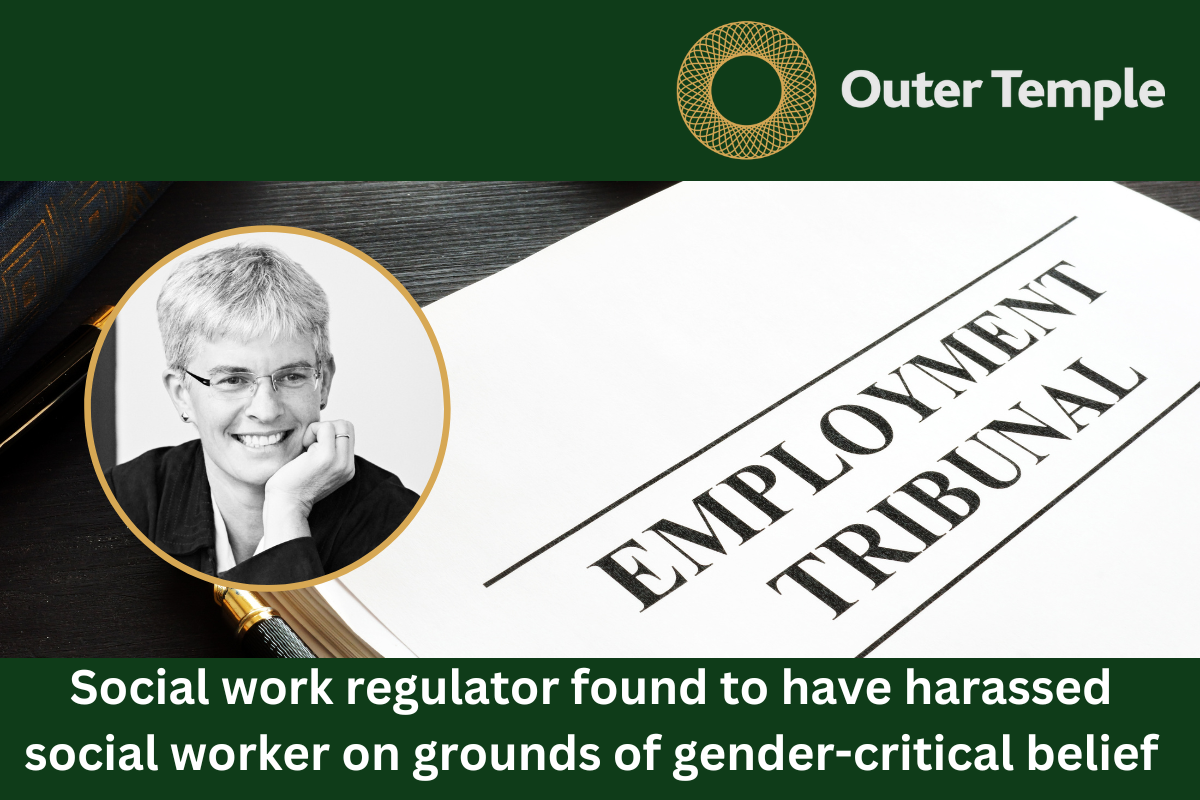Insights / News
Insights / News

Social worker Rachel Meade has successfully sued her employer, Westminster City Council (WCC), and professional regulatory body, Social Work England (SWE), in an employment tribunal for discrimination on the basis of her protected beliefs under the Equality Act 2010.
Between 2018 and 2020, Meade had shared posts about upholding women’s rights from various organisations, during the then reform consultation for the Gender Recognition Act 2004, with many of her posts being links to national newspaper stories and articles by advocacy groups such as Fair Play for Women and Women’s Place UK.
A former colleague and Facebook friend reported Meade to SWE in June 2020 for sharing gender-critical posts in a private group. They suggested that engaging in the debate around self-ID and single-sex spaces was inconsistent with practice as a social worker.
In July 2021, SWE’s investigation found the posts to be ‘discriminatory’ and sanctioned Meade for 12 months, ruling that her ‘fitness to practise is impaired by way of misconduct’. Meade was then suspended by her employer WCC with a warning that she was at risk of being dismissed for gross misconduct. After nearly a year’s suspension, the Council held a disciplinary hearing at the end of which it gave Meade a final written warning for gross misconduct, but allowed her to return to work.
In October 2022 SWE was granted a discontinuance of the fitness to practice proceedings, stating it did not intend to defend its position. Soon after, WCC followed suit and removed the written warning from Meade’s record.
Meade complained that both the regulatory and the disciplinary processes were acts of harassment related to her protected “gender-critical” belief. The tribunal agreed.
Judge Nicolle found that both her regulator and her employer had subjected Meade to harassment related to her gender-critical belief when SWE threatened her with fitness to practice proceedings and sanctioned her for misconduct, and then WCC suspended her for a year on charges of gross misconduct. There will be a remedy hearing in February.
The case is the latest in a series of cases about discrimination on grounds of gender-critical belief, starting with Forstater v CGD, in which Maya Forstater had to go to the Employment Appeal Tribunal to establish that gender critical belief was protected under the Equality Act. Other cases that have followed Forstater include barrister Allison Bailey’s claim against Stonewall and her chambers; Denise Fahmy’s win against Arts Council England for harassing her on grounds of her gender-critical belief; Professor Jo Phoenix’s claim against the Open University (where the Social Work England Case Examiner, Graham Noyce, criticised in the tribunal’s judgment in Meade’s case also works); and James Esse’s claim against Middlesex University for expelling him from a course that was part of his training as a therapist.
Shazia Khan of Cole Khan Solicitors, says “This judgment sounds an alarm for all regulators — and all employers of regulated professionals — that they must not let their processes be weaponised by activists bent on silencing dissent.”
In her closing submissions, Naomi Cunningham said: “The profession as a whole – to which questions about sex and gender, the right to single-sex spaces and single-sex intimate care, and the best approach to gender distressed children will be highly salient – has been effectively silenced on these matters. …[T]he regulator shows no sign that it is willing to remove that restraint and encourage social workers to discuss these important matters freely and openly. That is a matter of the utmost gravity for the profession as a whole, and for the vulnerable clients it serves.“
Rachel was represented by Naomi Cunningham of Outer Temple Chambers, instructed by Shazia Khan and Tom Moore of Cole Khan Solicitors LLP.
The full judgment can be found here.
This case has attracted much attention from the press and social media including:
Naomi Cunningham has specialised in discrimination law, mainly but not exclusively in the employment context, throughout her career.
In recent years, Naomi has developed a particular interest in the interaction between the Equality Act and the Gender Recognition Act, gender reassignment discrimination, the single-sex exceptions in the Equality Act, and the public sector equality duty. She gave evidence to the Women and Equalities Select Committee on reform of the GRA in February 2021, and to the Equalities, Human Rights and Civil Justice Committee of the Scottish Parliament in June 2022, and again to the Women and Equalities Select Committee at Westminster in January 2023.
Her public law work in the area includes Fair Play For Women’s judicial review of ONS guidance on the sex question in the 2021 Census, a challenge to the lawfulness of the EHRC’s Code of Practice in AEA v EHRC, and FOIA appeals involving information held by the Judicial College and the Crown Prosecution Service.
To find out more about Naomi, contact Nick Levett +44 (0)20 7427 4908 or Mark Gardner +44 (0)20 7427 4909.
News 9 Jan, 2024